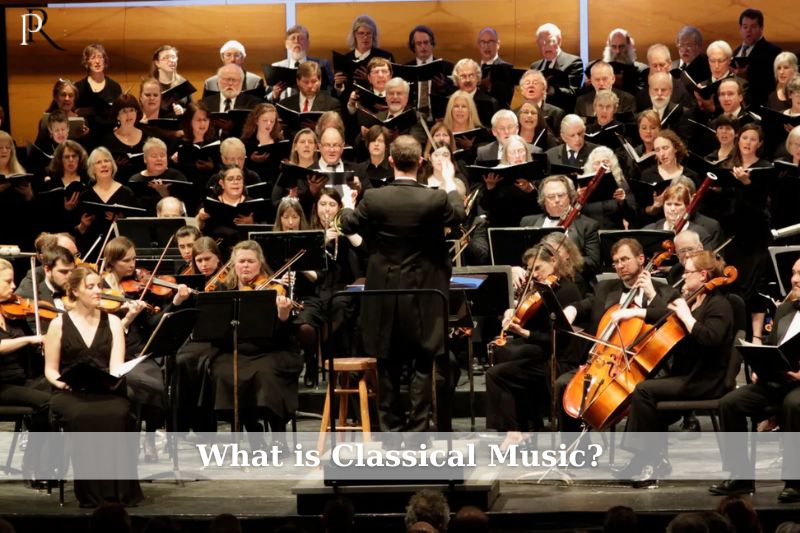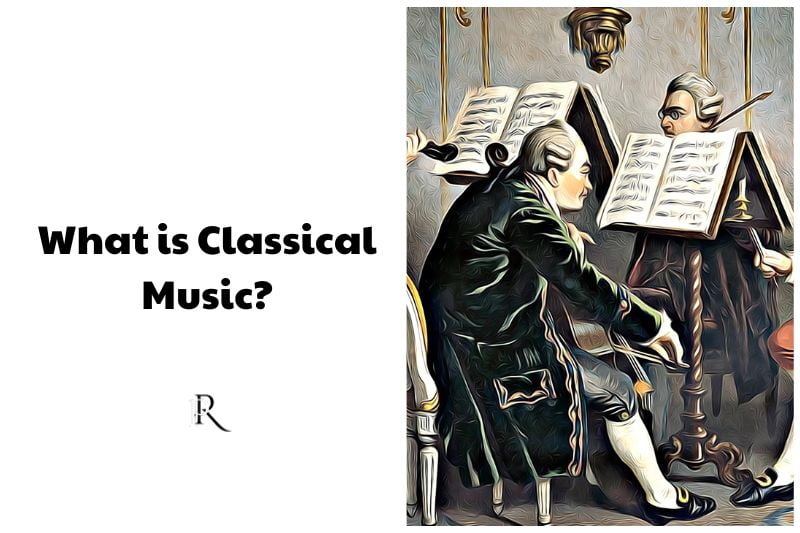What is classical music? Join Rachel Parris as we dive deep into its elegant world. From timeless compositions to influential composers, get ready to explore every facet of this musical tradition.
Whether you’re a first-time listener or a classical aficionado, there’s something here for everyone.
Contents
- 1 What is Classical Music?
- 2 Exploring the Different Periods of Classical Music
- 3 Unveiling the Instruments of the Orchestra
- 4 Understanding the Cornerstones of Classical Music
- 5 The Power of Listening to Classical Music
- 6 Getting Started with Classical Music
- 7 FAQ About Classical Music
- 7.1 What are the main periods of classical music?
- 7.2 What is the difference between a symphony and a concerto?
- 7.3 Who are considered the key composers of the Baroque period?
- 7.4 What characterizes the Classical period of music?
- 7.5 Can I stream classical music performances online?
- 7.6 How do I get permission to use a classical music score for a performance?
- 7.7 What are some tips for attending a classical music concert?
- 7.8 Are there educational programs available for classical music?
- 7.9 How has the role of the orchestra changed over time?
- 7.10 What should I know about the acoustics and seating in a concert hall?
- 8 Conclusion
What is Classical Music?

Hey there, curious minds! Today, we’re diving into the enchanting world of classical music, a revered genre within Western art music.
Classical music isn’t just your background score for fancy dinners; it’s a rich, intricate tapestry of sound that has evolved significantly over centuries.
Rooted deeply in Western Europe, classical music has grown from its monophonic Gregorian chants into complex symphonic works that continue to mesmerize audiences today.
Exploring the Different Periods of Classical Music
Classical music isn’t static; it’s been on a journey through various periods, each marked by distinct styles and innovations.
Let’s start with the Baroque period, where music was all about drama and the grandeur of orchestration, featuring the well-loved works of Bach and Handel.
Moving forward, the Classical period refined music into a clear, balanced form, as exemplified by the masterpieces of Mozart and Haydn.
Then came the Romantic era, where composers like Beethoven and Brahms focused on expressing deep emotions and complex narratives through music.
Each period not only defined the musical complexity but also influenced the development of musical instruments and compositions, leading to the rich diversity we enjoy in classical music today.
Unveiling the Instruments of the Orchestra
Diving deeper into the world of classical music, let’s talk about the orchestra—an impressive ensemble that brings compositions to life. An orchestra is divided into four main families of instruments: Strings, Woodwinds, Brass, and Percussion.
Each family contributes uniquely to the overall sound, creating the lush, immersive experience classical music is known for.
From the violins offering melodious harmonies to the bold and powerful blasts from the brass section, every instrument plays a pivotal role in the orchestral setup.
Understanding the Cornerstones of Classical Music

At the heart of classical music are the forms that structure the compositions—Symphony, Concerto, and Sonata. A symphony is a lengthy composition for an orchestra, often comprising multiple movements that evoke a wide range of emotions.
A concerto, on the other hand, is designed to showcase a soloist against the backdrop of the orchestra, providing a dramatic contrast that highlights the performer’s skills.
Lastly, the sonata form is fundamental in both solo and chamber music, known for its thematic development and structural clarity.
The Power of Listening to Classical Music
Listening to classical music isn’t just an auditory experience; it’s a journey that can stimulate emotions, provoke thoughts, and even benefit mental health.
Studies suggest that engaging with classical music can enhance brain function, reduce stress, and improve productivity.
Whether it’s the complex fugues of Bach or the soothing melodies of Debussy, classical music has a profound ability to affect listeners on multiple levels.
Getting Started with Classical Music
Interested in exploring classical music but not sure where to start? It’s all about diving into the works that have stood the test of time.
Begin with iconic symphonies by Beethoven or Mozart’s operas. You can find these in easily accessible formats like CDs or online streaming platforms.
Attending live concerts can also offer a transformative experience, giving you a taste of the music as it’s meant to be heard—in a communal setting, where every note resonates perfectly in space.
Let’s explore more music genre:
Folk music essentials
Basics of pop music
Rhythm and blues explained
Country music overview
Understanding blues music
Fundamentals of jazz music
Basics of rock music
FAQ About Classical Music

What are the main periods of classical music?
Classical music is broadly divided into six eras: Early and Late Medieval, Renaissance, Baroque, Classical, Romantic, and 20th Century each characterized by distinct styles and compositional techniques.
What is the difference between a symphony and a concerto?
A symphony is a large-scale orchestral work typically structured in multiple movements, while a concerto features a soloist accompanied by an orchestra, often showcasing virtuosic displays by the soloist.
Who are considered the key composers of the Baroque period?
Notable composers of the Baroque period include Johann Sebastian Bach, Antonio Vivaldi, and George Friedrich Handel, known for their complex polyphonic music and development of forms like the concerto and the sonata.
What characterizes the Classical period of music?
The Classical period (1730-1820) favored a clearer and lighter texture than Baroque music, emphasizing homophonic melodies over a chordal accompaniment, exemplified in the works of composers like Mozart and Haydn.
Can I stream classical music performances online?
Yes, many classical music performances are available for streaming. Websites like Wise Music Classical provide detailed guides and permissions for using their music on various platforms.
How do I get permission to use a classical music score for a performance?
To use classical music scores legally, one must obtain licenses for performance, which might include stage, film, or other public displays. This generally requires direct negotiation with the rights holders.
What are some tips for attending a classical music concert?
It’s advised to arrive early, dress suitably, and familiarize yourself with the concert etiquette, such as not recording or taking photos during the performance. Free concerts may not require tickets.
Are there educational programs available for classical music?
Yes, various organizations offer educational programs that might include pre-performance talks, workshops, and interactive concerts aimed at making classical music accessible to a broader audience.
How has the role of the orchestra changed over time?
Over periods, orchestras have grown in size and complexity, starting from basic string sections to full ensembles featuring woodwind, brass, and percussion, reflecting changes in musical styles and compositional complexity.
What should I know about the acoustics and seating in a concert hall?
Acoustics can vary significantly between venues; seats closer to the stage are generally better for visual and auditory connection to the performers, though some concert halls are designed to provide excellent sound from any location.
Conclusion
At rachelparris.com, we’ve journeyed through what classical music is and its transcendent qualities. Continue to explore this elegant genre with us and experience the profound impact classical music can have on your life. Stay tuned for more insights and enriching content.

